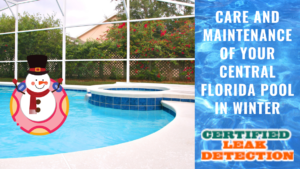
It’s winter in Florida! Or what passes for it, anyway. While overnight temperatures in December plunge to what Florida natives and semi-natives consider freezing, afternoons are typically sunny and warm. January and February are a different story, as these are our coldest months. So you may still be enjoying a mid-day dip in your pool, but it’s time to consider modifying care and maintenance until true swimming season resumes in late spring.
If you’re a recent transplant to the Sunshine State from a northern locale, you need to know that winter pool care here is very different! As we always remind our readers, Certified Leak Detection specializes in detecting leaks in pools, spas and fountains. We don’t perform swimming pool maintenance, but we want people to enjoy their slice of Central Florida paradise to the fullest. Maintaining your pool properly will help you do just that! Plus, the more involved you are with your pool’s upkeep, the more aware you’ll be of conditions that may indicate a leak.
To Close or Not to Close – That is the Question
Those who relocate to Florida from a state that experiences a true winter are accustomed to closing their pool for the season – and may be wondering if it’s necessary to do likewise here. The short answer is an emphatic “no!” The good people at SE Pool Supply & Chemical, Inc., explain why.
“The main purpose of winterizing a pool is to protect it from damage due to freezing water. Even if we get a cold snap, our Florida weather is not consistently cold enough to warrant closing your pool. The best news is that it is far less expensive to maintain your pool than it is to close it.”
In addition, no matter where your former address, you may be visited by family and friends from up north, or who live in a country with harsh winters. Although you might consider it too cold to go swimming, they probably won’t! Be a good host, and keep your pool sparkling clean and welcoming for them.
Florida Winter Pool Care 101: Don’t Drain the Pool – ANY Pool!
No matter what kind of pool you have – be it concrete, fiberglass, vinyl liner or above-ground – never drain it, for any reason! In Florida, draining the pool will do a great deal of harm, and no good whatsoever. Our blog post – “Why You Should Never Drain Your Pool Yourself” – covers the numerous reasons to not drain your swimming pool, which include the following:
- When too much pool water soaks into the ground, the resulting upward water pressure (hydrostatic pressure) could crack the bottom of your pool or cause it to float right out of the ground.
- In the case of fiberglass pools, the floors can split altogether, necessitating repairs to the fiberglass shell, plumbing, side walls (which can bulge outwards or even pop as a result of the sudden lack of water pressure) and pool deck.
- For both inground and above-ground pools, the liner can shrink when the pool is drained, then tear when the pool is refilled. Refilling promptly and shifting the liner in the early stages of refilling can mitigate this. However, this is not a good idea with older liners.
- Excess ground water can cause pool liners to float away from the walls, causing wrinkles.
Your Five-step Winter Maintenance Program
Your pool won’t get a great deal of use during winter, but you still need to keep it clean and functioning. The experts at Pool Works and Pools by Bradley provide the following steps for a winter maintenance program:
- Remove pool toys and accessories. Store them in a dry place to prevent mold/mildew growth.
- Balance the chemicals in your pool; continue to maintain the water balance throughout the winter. Algae can thrive in pools during this time due to the fluctuating weather. This is one reason why it’s important to maintain the chemical balance, even when you aren’t using your pool. Another reason is that it will save you time and money in the spring, when you’re ready to use it regularly. You can lower the amount of chlorine in the water, since it won’t have to kill contaminates from people using the pool. It is a good rule of thumb to test the pool water at least once a week during this time.
- Keep the water circulating by running the pump for 4-6 hours a day. This will also help prevent algae growth.
- Continue your pool cleaning routine, such as removing leaves and debris from the water and cleaning the debris traps or skimmers. Old leaves can also cause stains on the sides and floor of your pool and promote algae growth. Your pool filter should continue to run, and you should regularly vacuum the pool to remove debris. This will help you maintain a healthy water balance and keep it clean for spring.
- Keep an eye on the water levels. Since Florida has less rainfall in the winter to replace evaporated water, the water level can drop one to two inches a week. If the water level falls below the skimmers, it can cause many problems. That’s why it’s important to monitor your pool’s water level and add water as needed to keep the water level above the skimmers.
Using a pool cover is an option for those who don’t swim (or host anyone who does) over the winter months. Obviously, a cover keeps out leaves, dirt and other debris. Also, because the pool water isn’t exposed to sunlight, chlorine levels don’t need to be adjusted as often, and the water is much slower to evaporate. However, pool covers are typically designed for rectangular-shaped pools. For those who want to enjoy their pool year-around and can afford it, investing in a pool heater can be worth the expense!
The Take-Home Message for Winter Pool Maintenance
As you’ve learned, unless you cover your pool for the winter, you don’t get a big break on maintenance duties if you take the DIY approach instead of hiring a professional pool maintenance service. As mentioned earlier, one advantage of being hands-on is that you’ll be better able to observe issues that could indicate a leak
An undetected pool leak will increase your water bill and become worse over time, leading to extensive damage that will be more expensive to repair. Some leaks are easy to find, but there are many that pool owners can’t detect without professional assistance. Certified Leak Detection uses technology and techniques we have developed over 20 years in business.
In addition to quick detection and repair of swimming pool leaks, we provide industry-leading leak detection and repair for spas, hot tubs and fountains. Serving areas throughout Central Florida – including Orlando, Longwood, Lake Mary, Sanford, Kissimmee, Clermont and Winter Springs – our team is ready to answer your call.
Contact us for quick, reliable service.

